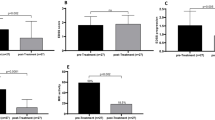Abstract
A CNS demyelination event in a person aged ≤ 18 years could signify the initial clinical presentation of multiple sclerosis (MS), a chronic, neuroinflammatory and neurodegenerative CNS disorder. The disease course of paediatric-onset MS (POMS) is typically more inflammatorily active than that of adult-onset MS, resulting in more frequent relapses but slower disability accumulation. Such early and frequent neuroinflammatory attacks can lead to impaired brain development and poor cognitive performance. Patients with POMS should be promptly diagnosed and treated with immunomodulators to delay physical worsening and cognitive decline. However, the use of disease-modifying therapies (DMTs) is mostly off-label and data are limited.
Similar content being viewed by others
References
Jakimovski D, Awan S, Eckert SP, et al. Multiple sclerosis in children: differential diagnosis, prognosis, and disease-modifying treatment. CNS Drugs. 2022;36(1):45–59.
Fadda G, Armangue T, Hacohen Y, et al. Paediatric multiple sclerosis and antibody-associated demyelination: clinical, imaging, and biological considerations for diagnosis and care. Lancet Neurol. 2021;20(2):136–49.
Brenton JN, Kammeyer R, Gluck L, et al. Multiple sclerosis in children: current and emerging concepts. Semin Neurol. 2020;40(2):192–200.
McKay KA, Hillert J, Manouchehrinia A. Long-term disability progression of pediatric-onset multiple sclerosis. Neurology. 2019;92(24):e276-73.
Baroncini D, Simone M, Iaffaldano P, et al. Risk of persistent disability in patients with pediatric-onset multiple sclerosis. JAMA Neurol. 2021;78(6):726–35.
Kopp TI, Blinkenberg M, Chalmer TA, et al. Predictors of treatment outcome in patients with paediatric onset multiple sclerosis. Mult Scler. 2020;26(8):964–75.
Chitnis T, Arnold DL, Banwell B, et al. Trial of fingolimod versus interferon beta-1a in pediatric multiple sclerosis. N Engl J Med. 2018;379(11):1017–27.
Chitnis T, Tardieu M, Banwell B, et al. Evaluation of teriflunomide in children and adolescents with relapsing MS: TERIKIDS phase 3 study design, enrollment update, and baseline data [abstract no. P4.354]. Neurology. 2018;90(15 Suppl).
Chitnis T, Banwell B, Kappos L, et al. Safety and efficacy of teriflunomide in paediatric multiple sclerosis (TERIKIDS): a multicentre, double-blind, phase 3, randomised, placebo-controlled trial. Lancet Neurol. 2021;20(12):1000–11.
Novartis Europharm Limited. Gilenya hard capsules: EU summary of product characteristics. 2022. https://www.ema.europa.eu/. Accessed 30 May 2022.
Novartis A. GILENYA (fingolimod) capsules, for oral use: US prescribing information. 2019. https://www.fda.gov/. Accessed 30 May 2022.
Genzyme Corporation. AUBAGIO (teriflunomide) tablets, for oral use: US prescribing information. 2021. https://www.fda.gov/. Accessed 30 May 2022.
sanofi-aventis groupe. AUBAGIO film-coated tablets: EU summary of product characteristics. 2022. https://www.ema.europa.eu/. Accessed 30 May 2022.
US National Institutes of Health. ClinicalTrials.gov identifier NCT03958877. 2022. https://clinicaltrials.gov/. Accessed 31 May 2022.
Chitnis T, Tenembaum S, Banwell B, et al. Consensus statement: evaluation of new and existing therapeutics for pediatric multiple sclerosis. Mult Scler. 2012;18(1):116–27.
Ghezzi A, Banwell B, Boyko A, et al. The management of multiple sclerosis in children: a European view. Mult Scler. 2010;16(10):1258–67.
Ghezzi A, Amato MP, Annovazzi P, et al. Long-term results of immunomodulatory treatment in children and adolescents with multiple sclerosis: the Italian experience. Neurol Sci. 2009;30(3):193–9.
Tenembaum SN, Banwell B, Pohl D, et al. Subcutaneous interferon beta-1a in pediatric multiple sclerosis: a retrospective study. J Child Neurol. 2013;28(7):849–56.
Gartner J, Bruck W, Weddige A, et al. Interferon beta-1b in treatment-naive paediatric patients with relapsing-remitting multiple sclerosis: two-year results from the BETAPAEDIC study. Mult Scler J Exp Transl Clin. 2017;3(4):2055217317747623.
Alroughani R, Das R, Penner N, et al. Safety and efficacy of delayed-release dimethyl fumarate in pediatric patients with relapsing multiple sclerosis (FOCUS). Pediatr Neurol. 2018;83:19–24.
Alroughani R, Huppke P, Mazurkiewicz-Beldzinska M, et al. Delayed-release dimethyl fumarate safety and efficacy in pediatric patients with relapsing-remitting multiple sclerosis. Front Neurol. 2020;11:606418.
US National Institutes of Health. ClinicalTrials.gov identifier NCT02283853. 2022. https://clinicaltrials.gov/. Accessed 31 May.
Ghezzi A, Comi G, Grimaldi LM, et al. Pharmacokinetics and pharmacodynamics of natalizumab in pediatric patients with RRMS. Neurol Neuroimmunol Neuroinflamm. 2019;6(5):e591.
Ghezzi A, Moiola L, Pozzilli C, et al. Natalizumab in the pediatric MS population: results of the Italian registry. BMC Neurol. 2015;15:174.
Krysko KM, Graves JS, Rensel M, et al. Real-world effectiveness of initial disease-modifying therapies in pediatric multiple sclerosis. Ann Neurol. 2020;88(1):42–55.
Ghezzi A, Banwell B, Bar-Or A, et al. Rituximab in patients with pediatric multiple sclerosis and other demyelinating disorders of the CNS: practical considerations. Mult Scler. 2021;27(12):1814–22.
Margoni M, Rinaldi F, Miante S, et al. Alemtuzumab following natalizumab in highly active paediatric-onset multiple sclerosis. Mult Scler J Exp Transl Clin. 2019;5(3):2055217319875471.
US National Institutes of Health. ClinicalTrials.gov identifier NCT03368664. 2021. https://clinicaltrials.gov/. Accessed 31 May 2022.
Burman J, Kirgizov K, Carlson K, et al. Autologous hematopoietic stem cell transplantation for pediatric multiple sclerosis: a registry-based study of the Autoimmune Diseases Working Party (ADWP) and Pediatric Diseases Working Party (PDWP) of the European Society for Blood and Marrow Transplantation (EBMT). Bone Marrow Transpl. 2017;52:1133–7.
US National Institutes of Health. ClinicalTrials.gov identifier NCT02200718. 2020. https://clinicaltrials.gov/. Accessed 31 May 2022.
Author information
Authors and Affiliations
Corresponding author
Ethics declarations
Funding
The preparation of this review was not supported by any external funding.
Authorship and conflict of interest
S. M. Hoy is a salaried employee of Adis International Ltd/Springer Nature and declares no relevant conflicts of interest. All authors contributed to the review and are responsible for the article content.
Ethics approval, Consent to participate, Consent for publication, Availability of data and material, Code availability
Not applicable.
Additional information
Publisher’s Note
Springer Nature remains neutral with regard to jurisdictional claims in published maps and institutional affiliations.
Rights and permissions
Springer Nature or its licensor holds exclusive rights to this article under a publishing agreement with the author(s) or other rightsholder(s); author self-archiving of the accepted manuscript version of this article is solely governed by the terms of such publishing agreement and applicable law.
About this article
Cite this article
Hoy, S.M. Diagnose and treat paediatric-onset multiple sclerosis promptly to delay physical worsening and cognitive decline. Drugs Ther Perspect 38, 389–393 (2022). https://doi.org/10.1007/s40267-022-00938-2
Accepted:
Published:
Issue Date:
DOI: https://doi.org/10.1007/s40267-022-00938-2



